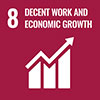The European Union's foreign trade: realities and challenges
The EU remains well ranked in many indicators of global competitiveness, with extra-EU trade showing very good figures for both goods and services. This is in spite of the recent growth problems that have affected intra-European trade. The quality of European exports, the role of manufacturing in Europe and the capacity to sustain creative and innovative dynamics are all significant positive performers that must be kept in full swing, in the face of growing pressures from emerging economies in all these areas. To do this requires reinforcing the EU's position as a global actor, and involving a growing critical mass from within the productive sector. In addition, tendencies towards mega-regional trade agreements – with agreements projected on the Atlantic and Pacific stages – propose new ways of establishing rules in global trade, something that calls for a carefully composed response from the EU.
ODS


 Juan Tugores Ques
Juan Tugores QuesHe was Dean of the Faculty of Economics and Business Studies at the UB (1994-1998) and Rector of the UB (2001-2005). He is a Counsellor at the Open University of Catalonia and a specialist in International Economics, having authored books such as Macroeconomía (2nd ed. Editorial UOC, 2013), Crisis: lecciones aprendidas…o no (Marcial Pons editor, 2010) and Economía internacional: globalización e integración regional (6th edition, McGraw-Hill, 2006). He regularly writes for publications such as La Vanguardia and Expansión.



